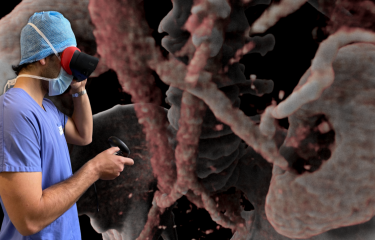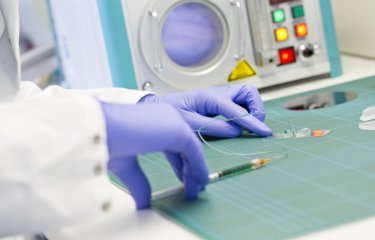On July 4, the i-Lab innovation competition unveiled the names of its 75 winners, which this year included Aimee Wessel and Raphaël Tomasi from the Physical Microfluidics and Bioengineering Unit (Institut Pasteur/École Polytechnique/CNRS). Sponsored by the French Ministry of Higher Education, Research and Innovation and organized in partnership with Bpifrance Financement, i-Lab is France's leading deep tech innovation competition. It supports promising projects for the creation of companies with a strong technological component by offering generous financial grants (up to €600,000) and tailored guidance.
Using microfluidics to help predict how cells will respond to drugs
With MultiScreen technology, thousands of 3D cell cultures can be formed in microfluidic droplets using very small sample volumes. All the fluidic components are miniaturized using microchannels no larger than a human hair, which gives scientists precise control over the position and manipulation of cells. Thousands of complex biological protocols (co-culture, high-throughput screening, etc.) are performed on a microfluidic chip than fits into the palm of the hand.
Unlike traditional 2D cell cultures, 3D cultures reproduce the cell's native environment more closely in the laboratory, providing more predictive results. The aim of the MultiScreen project is to simplify the high-throughput formation and manipulation of these 3D cultures, with multiple potential applications in research, pharmaceuticals and personalized medicine.
A start-up in 2020
MultiScreen is based on a patented technology that has been developed over the past five years by the École polytechnique and the Institut Pasteur in Dr. Charles Baroud's laboratory. The project, supported by the Pasteur Microbes and Health Carnot Institute and DIM ELICIT (Empowering Life Sciences with Innovative Technologies, a Field of Major Interest (DIM) for the Greater Paris region), offers a comprehensive, robust 3D culture solution that combines automation and high-throughput technology.
The MultiScreen offering involves purchasing a microfluidics instrument, consumables – microfluidic chips in which 3D cell cultures are developed – and an image analysis solution to obtain high-throughput quantitative results.
A first prototype of the technology is currently being installed in the Cytometry and Biomarkers UTechS (CB UTechS) platform led by Milena Hassan, for use by scientists at the Institut Pasteur and external teams. The start-up, currently still at the maturation stage, will be launched in 2020 with financial support and guidance from i-Lab.
21st edition of the innovation competition
i-Lab is a growth accelerator for innovative companies. Over 21 editions, it has contributed to the creation of 2,008 technology companies and is now recognized as a leader in innovation. In 2019, the panel selected 75 winners from the 468 finalists in the national competition. Each new company will receive a grant of up to €600,000.
i-Lab was set up by the French Ministry of Higher Education, Research and Innovation as a means of boosting support for the creation of innovative companies, offering more effective guidance to facilitate start-up development, and encouraging entrepreneurial spirit, especially among scientists and students in higher education.






